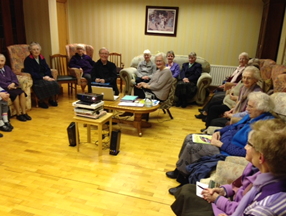 Fr. Liam Dunne SVD, Convenor of VIVAT sent ECI this report:
Fr. Liam Dunne SVD, Convenor of VIVAT sent ECI this report:
Vivat in Ireland is formed of representatives of Missionary Sisters, servants of the Holy Spirit; the Spiritans; the Missionary Sisters of the Holy Rosary; The Little Sisters of the Assumption; the Divine Word Missionaries, the Oblates of Mary Immaculate and the Combonis, who joined us during the year.
Our group is small but enthusiastic. We meet every two months in each one of our houses for our meeting. We use these to share information; to seek ideas about matters of interest to our various Congregations and to draw up plans. We also reflect upon what our Congregations are doing in the wider world at this time and share this with each other. Our meetings usually begin with a prayer, followed by, or ending with, a supper prepared by the host. The attendance has been good all year which indicates the interest and the willingness of the members to participate.
Our main activity during the year 2018 was the study of Laudato ‘Si. Each group took one Chapter each, to study and presented the results to the group. We all then evaluated and added further reflections. This was a worthy exercise for us as it stimulated us all to learn more about the Cry of the Earth and to discover what we could do about it in our communities. Some results were that one group decided to curtail their shopping on Sundays; others took recycling much more seriously and got their community to follow suit; and some of us got involved with another group called Recycling Ambassadors.
For this, we arranged to get about 20 people to convene somewhere and these ambassadors would come and give a very practical demonstration about how to recycle properly which proved to be both informative and useful.
Another undertaking carried out by our members, Tom McCabe OMI and Mary Rose Crowe MSRH, was the running of workshops called Awakening the Dreamer Changing the Dream. This workshop reflected upon the precarious situation in which the earth finds itself now. They also presented the workshop at the McAuley House in Coolock with good feedback. Another workshop was presented to a community of retired sisters and friends over two evenings.
The BtC symposium attempts to answer 4 questions:
1. Where are we?
2. How did we get here?
3. What is possible now?
4. Where do we go from here?
It locates the root causes of the present environmental crisis in a mindset, growing in dominance since the industrial revolution, which views the earth merely as a source of raw materials to meet our immediate needs, where humans have all the rights.
Among the myths supporting this mindset/attitude, the symposium identifies the myth of separateness, that we humans are separate from the earth and other species.
Both the symposium and Laudato Si confront this myth by stressing the inter-connectedness of all creation. ‘Whatever we do to the planet we do to ourselves on Planet Earth’ (BtC). ‘Earth is a communion of subjects, not a collection of objects’. (Thomas Berry).
Laudato Si (para 16): ‘If we no longer speak the language of fraternity and beauty in our relationship with the world, our attitude will be that of masters, consumers, ruthless exploiters unable to set limits to their immediate needs’.
Both recognise that the first victims of a degraded environment are the poor, those who benefitted least from this exploitation, indigenous peoples etc. Both recognise the rights of all species to flourish and the tragedy of the unprecedented rate of species loss that we are living through.
BtC challenges us to wake up from the trance we are in, to become aware, and to commit our growing awareness in action by joining with others to work for change.
Laudato ‘Si urges radical conversion, a change in attitude, spirituality, lifestyle etc., and action: ‘the talents and involvement of all is needed to redress the damage caused by human abuse of God’s creation’. (LS 14)
Both BtC and Laudato ‘Si are ultimately hopeful that we humans can change, become aware, but that time is running out. Everyone on earth has a role to play. ‘Be the change’ sees the contribution that new technologies designed to work with nature can make. Laudato Si invites humanity, and Christians in particular to radical conversion.
We hope to train all the members of our group to be able to present this symposium in the future.
